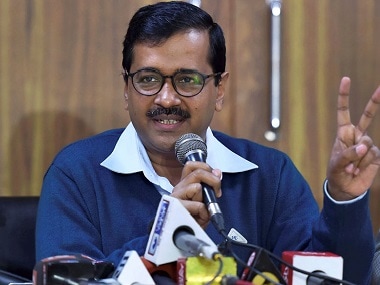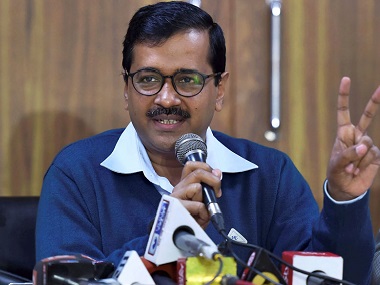On Wednesday, the Supreme Court of India (SC), in a landmark judgment, upheld the bedrock principles of a representative democracy. It ruled that the democratically elected state government of Delhi, led by Chief Minister Arvind Kejriwal, has the complete right to govern and legislate for the welfare of the people who reposed confidence in it in 2015 by delivering an overwhelming mandate of 67 out of 70 Legislative Assembly seats. [caption id=“attachment_4505833” align=“alignleft” width=“380”]  File image of Delhi chief minister Arvind Kejriwal. PTI[/caption] This judgment comes against the background of vicious political vendetta that has been unleashed by the Bharatiya Janta Party (BJP) upon the Aam Aadmi Party (AAP) following the 2015 state elections where Kejriwal consigned BJP, an erstwhile Goliath in Delhi politics, to a non-decrepit pygmy burdened with dropping external expectations and ridden with paralysing factionalism from within. The BJP, through the constitutional office of the unelected lieutenant governor (L-G), left no stone unturned to cripple the AAP government in Delhi. SC judgment a scathing indictment of L-G Let us now see what the SC detailed (at 535-pages long and the majority argument written by CJI Dipak Misra) and tinging order makes the following astute observations: 1. “…As far as the Lieutenant Governor of Delhi is concerned, as per Article 239AA(4), he is bound by the aid and advice of his Council of Ministers…” 2. “…As per the 1991 Act and Rules of Business, Lieutenant Governor has to be apprised of every decision taken by the Council of Ministers. However, Lieutenant Governor cannot change the decision… It has to be clearly stated that requiring prior concurrence of the Lieutenant Governor would absolutely negate the ideals of representative governance and democracy conceived for the NCT of Delhi by Article 239AA of the Constitution. 3. “…The Lieutenant Governor need not, in a mechanical manner, refer every decision of his Ministers to the President. He has to be guided by the concept of constitutional morality…” 4. “…The Lieutenant Governor is to act with constitutional objectivity keeping in view the high degree of constitutional trust reposed in him while exercising the special power ordained upon him…” 5. “…Section 41 of the 1991 Act shows that the Lieutenant Governor can act in his discretion only in matters which fall outside the legislative competence of the Legislative Assembly of Delhi or in respect of matters of which powers are entrusted or delegated to him by the President…therefore, it is clear that the Lieutenant Governor cannot exercise his discretion in each and every matter and by and large, his discretionary powers are limited to the three matters (land, police and law & order)…” 6. “…The exercise of establishing a democratic and representative form of government for NCT of Delhi by insertion of Articles 239AA and 239AB would turn futile if the Government of Delhi that enjoys the confidence of the people of Delhi is not able to usher in policies and laws over which the Delhi Legislative Assembly has power to legislate for the NCT of Delhi…” Even Justice Chandrachud, agreeing with the majority, states unequivocally in para 142 that: “…first, the operation of the proviso should preserve the national concerns underlying the conferment of such a power, and second, the exercise of the power under the proviso must not destroy the essential democratic values recognised in Article 239AA…the Lieutenant Governor must make every effort with the Minister or, as the case may be, the Council of Ministers to resolve a matter of difference…” which is roughly tantamount to stating that the L-G can only differ, significantly, with the elected council of ministers in ‘exceptional cases’ restricting the scope of difference to matters of ‘national concern’. Clearly, the five-judge Constitutional Bench has favoured a purposive interpretation of the provisos of Article 239AA, drawing from the concepts of pragmatic federalism, federal balance, constitutional morality, and constitutional objectivity outlined by BR Ambedkar and various other committees such as the Sitaramayya Committee or the Balakrishnan Committee, instead of the more narrow, parochial and frankly, driven more by political concerns than anything else, interpretation favoured by the BJP-led central government. This damning judgment comes hot on the heels of another such case where the Delhi High Court summarily quashed the decision of the Election Commission of India (ECI) to disqualify 20 AAP MLAs and termed the ECI’s decision as ‘bad in law’ and one that was in clear contravention of nemo iudex in causa sua (rule against bias) and audiatur et altera pars (right to a fair hearing). SC gives precedence to the rule of ‘elected’ over ‘selected’ Delhi has a peculiar and befuddling di-archical structure of administration. For instance, in the present power structure, the elected chief minister and his cabinet have no say in the issues pertaining to recruitment (be it IAS, DANICS, or clerks), conditions of service and imposition of disciplinary processes action on unscrupulous officers. This power is vested with the L-G through the specious notification issued by the Ministry of Home Affairs (MHA) in 2015 with the express aim to curtail Kejriwal’s powers as a chief minister. As a direct consequence, for the past 3.5 years, with no control over ‘services’, the ministers are unable to hold the officers accountable for their actions and as a result projects and welfare schemes are riddled with interminable delays. The general populace on the other hand, which neither understands this nuance nor has time to go into the constitutional nitty-gritty, holds the elected representatives accountable for any failures of the officers in the government machinery even when the ministers have been asked to run a ministry with both their hands tied behind their backs. As of today, after this judgment, this wrong has been righted and this in itself is a huge victory for the AAP as now stalled projects, like Doorstep Delivery of Ration in Delhi, Development Work in Unauthorised Colonies, Mohalla Clinics, will start moving. A victory for democracy A sophisticated analysis shows that AAP is rapidly emerging as a credible alternative to the ruling BJP. What works for AAP is that it is not bound by regional, religious and caste-based equations. Its egalitarian ideology of welfare for the common man has increased its appeal manifold: To the Left, Centre and Right. Other than the BJP, AAP is the only continuously growing party in contemporary India. This is what rattles the BJP, which sees in Kejriwal a worthy challenger, unlike the craven and indolent Congress. And handicapping Kejriwal’s government is the best tool in BJP’s arsenal, no matter the irreversible harm being inflicted on the constitutional ethos of federalism and the repugnant repudiation of an overwhelming electoral mandate. It is said that even the slightest appearance of misuse of power on part of the constitutional institutions can jeopardise the independence of such bodies. However, the truant use of the office of L-G has made it as clear as day that the totality and finality with which rules and precedents are infringed upon — left, right and centre — without much regard; constitutional norms (or whatever is left of it) under the present political dispensation have become a mere tool of oppression, repression and political vendetta. First Arunachal Pradesh, then Uttarakhand, and now Delhi — BJP has repeatedly tried to play a dangerous and clever by half power game — and ended up with egg on its face every single time. Today’s judgment is a victory for democracy and a reaffirmation of faith in the judiciary. It is high time the Centre stops playing fast and loose with basic democratic processes and constitutional norms. Pranav Jain works with the AAP and Delhi government on key issues. He tweets @pranavj142. Click here to follow LIVE updates on AAP-LG power struggle
Today, the Supreme Court of India (SC), in a landmark judgment, upheld the bedrock principles of a representative democracy.
Advertisement
End of Article


)

)
)
)
)
)
)
)
)



